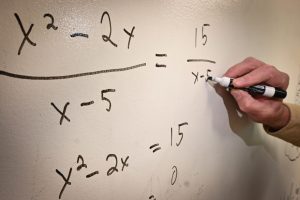I grew up in a home where it was made very clear to me that when I went to school I should give it my all and if I did the result would be good grades. My parents believed that I if I applied myself, I should be able to master all the material presented in the classes. When the time came for parent/teacher conferences, my parents looked at my report card for the results of my work and if it wasn’t an A, there needed to be an explanation.
My parents would confer with my teachers and asked them why I hadn’t done better in this subject or that. The answers usually provided my parents with ammunition for when they next saw me. The usual culprit for my less than stellar efforts was something I did or perhaps didn’t do. I often hurried through my work or was distracting to others or didn’t spend enough time. Thinking back on it all, I struggled to find an instance of when reason for my failure wasn’t directly connected to something I had done to sabotage myself. That is until it came to algebra.
I took algebra in 9th grade and thought it would be neat to learn another dimension of mathematics. I enjoyed solving math problems and going to the next level in math and so I looked forward to algebra. I don’t know exactly when those feelings of expectation turned to absolute confusion. I remember opening the book at the beginning of the school year and noticing these math problems not only had numbers but they also included letters. This made absolutely no sense to me at all and I began to panic. I decided that it would probably be like other experiences that started out being complicated but I would get it and then all would be well.
My first semester grade for algebra was a C and quite honestly, that was a very gracious grade! I didn’t understand it and when I brought that report card home I remember my parents making the usual assumptions they did when my grades weren’t great. I got in trouble because I must be goofing off. I must be hurrying through the problems. This time I wasn’t guilty. I was literally trying my hardest. I even stayed after school more than once to get help from my teacher and it really didn’t seem to help.
Algebra ruined my 9th grade year! I never made the honor roll because of it. My parents were constantly giving me grief over my grades because of it. For the first time in my academic career, I really felt like a failure. As crazy as it may sound, my experience with algebra really shook my world.
Later in life, when I moved back to my hometown to become the Pastor at my home church, my path crossed with my 9th grade algebra teacher. I remember as we got past the small talk telling her about how I struggled to comprehend algebra and that I felt like such a failure at the time because of it. She told me that she didn’t think I was a failure because of my struggles. She then told me something I would have never dreamed: she told me that she felt like a failure every time she saw students making honest effort to master the subject but never really did.
I have failed at many things since 9th grade algebra. Some, like algebra, were things that I was fully committed and engaged but never really got it. I suspect that we share that trait. Maybe we need to see failure not simply in terms of whether or not we are successful in this thing or that. Perhaps the real verdict is not known until our lives are completed. When we look back at the end of our life, what will we see?
We are all works in progress and Scripture reminds us that we must pay attention to our daily priorities and activities. Scripture gives a clear and definable path to wisdom which, if we pay attention to it and integrate in well into our lives, we will see success, God’s success.
The apostle Paul reminds us that it is in our weakness that God does perhaps His greatest work through us. I don’t think that means God expects me to teach algebra because of my weakness in it but rather that when we experience weakness or failure God is still able to accomplish His purposes through us. Having the perspective that as Christ-followers we are actually partners with God to accomplish His purposes is really helpful when dealing with failure or weakness. The hard reality of life is that others around us have failed or have been weak in the exact same ways we have. We have, however, the experience of having God stand with us during those moments that we now can relate to others when they struggle.
If this blog post finds you in a time where you are dealing with failure or weakness, good! I hope maybe it will help put things into perspective. But remember, failing at something doesn’t make us a failure but it does bring us to a place of decision: what will I do next? My hope is that your answer will always be to lean into Him.


Leave a Reply